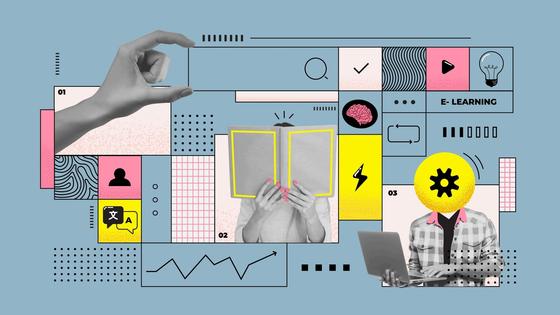What to Expect from Online Education in 2025
In the 21st century, the field of education is evolving faster than ever before.

Right now, in real-time, we are witnessing the emergence of new trends and approaches in learning that aim to make the process more comfortable, accessible and even easier for everyone. It is the rapid development of innovative technologies primarily drives these changes. Let's explore what to prepare for and what to anticipate in the upcoming year, 2025.
Personalized Learning with AI
Artificial intelligence is gradually permeating all areas of human activity, including education. Neural networks enable access to information, present material creatively, generate presentations and supplementary materials, and make the learning process more adaptive.
Uniform textbooks and standardized lessons are a thing of the past. Each student receives a personalized learning experience tailored to their current knowledge level, unique abilities, and needs. AI-based systems can analyze each learner's progress, identify strengths and weaknesses, adapt to existing skills, and adjust educational materials accordingly. For instance, if a student struggles with a particular topic, the neural network allocates additional time for completing assignments, offers extra resources, and provides exercises to review the material. Moreover, AI suggests books, videos, podcasts, and more based on individual interests, further enriching the educational journey.
Artificial intelligence can also adjust the complexity of materials to match each student's current knowledge level. Neural networks create personalized learning programs, allowing individuals to progress at their own pace. After each lesson, the system assigns assessment tasks, analyzes the results, and designs the lesson plan accordingly. In this way, AI has become a fully-fledged teaching assistant. It simplifies routine tasks like preparing lesson plans, presentations, and homework assignments. It handles more demanding responsibilities, such as analyzing students' knowledge levels, individual capabilities, and progress in developing specific skills. This flexible approach to education enhances student engagement and motivation, promotinges faster and more effective skill acquisition, improves academic performance, and reduces stress levels.
Expanding the Capabilities of Virtual and Augmented Reality
How can we explore the history of Ancient Greece, explain the principles of the nervous system, or visually demonstrate chemical reactions involving rare elements-all without leaving the classroom or putting students at risk? This is possible thanks to virtual reality (VR) and augmented reality (AR), which provide safe environments for conducting various experiments. For example, educational VR content includes the Apollo 11 VR space simulator, virtual art museums, and galleries like the Museum of Fine Arts, among many others. Immersive learning leverages VR and AR technologies and creates artificial or simulated environments that fully allow students to engage in the learning process without external distractions. In history classes, students can explore ancient civilizations, while in language classes, they can practice speaking English or other languages by interacting with virtual native speakers. This approach proves significantly more effective than passive activities like watching educational videos or listening to lectures.
In essence, these technologies are primarily used to provide students with immersive experiences. Virtual and augmented reality enhance their interest and engagement, free them from routine learning processes, and facilitate the rapid acquisition of new skills. The only significant hurdle preventing VR technologies from achieving as widespread adoption as artificial intelligence, for instance, is the requirement for additional equipment. Virtual reality headsets remain relatively expensive. However, more devices are becoming available with time, offering a broader range of options. Similarly, new virtual content is being developed rapidly, with educational institutions and EdTech platforms creating unique simulators and training tools. We are confident that by 2025, VR technologies will be accessible to anyone who wishes to use them.
Rising Interest in IT Professions

According to a report by the World Economic Forum, skills in artificial intelligence and Big Data are projected to be the most in-demand in the near future. The number of job openings related to neural network development and AI work grows significantly each year. In addition, there is a steady demand for systems analysts, Java and Python developers, game designers, cloud computing specialists, machine learning and automation experts, and cybersecurity professionals.
This need for skilled IT professionals and developers will only grow as nearly every business today integrates digital technologies into its operations, whether it's a supermarket chain, beauty salon, credit organization, advertising agency, or repair service. Businesses are creating websites and entire mobile applications to stay competitive. As a result, IT professionals are increasingly in demand in information technology and retail, electronics, and the financial sector.
Lifelong Learning: The Most Effective Strategy for Success
Lifelong learning, or as the saying goes, "Live and learn," has been regarded as a key trend over the past several years. This concept involves the continuous personal development of individuals in professional, social, spiritual, and other areas throughout their lives. It allows people to understand themselves better, discover hobbies they truly enjoy, achieve inner harmony, build stronger relationships with others, advance in their careers, earn more, and pursue their boldest dreams.
The growing popularity of lifelong learning is driven by the fact that the period of human activity is increasing in today's world. Moreover, studies have shown that just one additional year of education significantly reduces the risk of premature death. Additionally, lifelong learning positively impacts mental health, as acquiring new information, mastering new skills, and developing abilities improve cognitive functions.
For this reason, people strive to maintain their value in the job market, enhance their quality of life regardless of age, and make their time meaningful and productive by honing their skills, acquiring new ones, staying attuned to modern trends, and keeping up with current events. This process is made easier by the availability of online learning opportunities. Now, lifelong learning is accessible to everyone!
The Rise of Fast Education and Microlearning
The widespread adoption of lifelong learning has also driven the growing popularity of fast education. This methodology focuses on learning quickly and acquiring only the skills you truly need. In other words, fast education enables individuals to gain new knowledge without disrupting their primary job.
This system emphasizes practical skills, eliminating the need to spend time on unnecessary theoretical information. Learning through hands-on practice and real-life case studies is faster and more effective. In today's fast-paced world, speed is everything-staying on top of trends and upgrading skills that are in demand right now can lead to rapid success. As industries evolve unprecedentedly, fast education is becoming increasingly relevant. By 2025, this approach will likely dominate the EdTech landscape.
Focus on Post-Gamification

The term "gamification" is already well-known. It refers to integrating various game elements and mechanics into non-gaming tasks, such as work, education, and everyday life. In the learning process, gamification is no longer surprising. However, post-gamification is now gaining popularity. This extended format implies that gamification continues even after the formal learning process is complete. It provides additional benefits for learners and is also utilized by online platforms for marketing purposes, such as upselling courses or other educational products, creating newsworthy content, and more.
Post-gamification can take various forms, such as post-training support or educational marathons. Since this format follows the main learning phase, post-gamification must be even more engaging and, at the same time, more challenging. Learners should be given the opportunity to demonstrate all the knowledge and skills they have acquired fully.
In this way, post-gamification ensures the retention of knowledge by learners, allows them to reinforce their skills through practice, builds their confidence, and provides additional motivation for future achievements!
Lectera’s Online Courses by topic
The Growth of Digital Learning Ecosystems
Educational online platforms, corporate training programs, and similar initiatives are increasingly integrating with traditional educational institutions, forming interconnected ecosystems. These systems create networks of resources for acquiring new knowledge and skills, offering a more accessible, diverse, and enriching learning experience.
For instance, Hong Kong University is on the brink of launching the world's first campus in the metaverse, while virtual schools are rapidly gaining popularity in Japan. In Europe and the United States, many universities offer bachelor's and master's degrees either in-person or entirely online. Additionally, the hybrid learning model, combining face-to-face and online formats, has become widespread. This approach enables flexible scheduling, access to classes from anywhere, and learning at an individual pace. Such advancements reflect the evolution of educational ecosystems, which are expected to continue to thrive in the coming year.
Take note of these educational trends in 2025, most of which involve integrating innovative technologies into the learning process. Education remains one of the largest global industries, with the market expected to exceed $7 trillion by 2025. This significant growth paves the way for the adoption of cutting-edge technologies, ensuring learning experiences that are comfortable, accessible, diverse. This enriches everyone striving to acquire new knowledge, enhance their skills, and contribute to making the world a better place. The Lectera Magazine editorial team wishes you success and the fulfillment of all your goals in the upcoming year!
Share this with your friends via:
Latest News

In the UK, £23 million has been allocated for the expansion of the EdTech Testbed program — pilots of educational technologies in schools and colleges.

In the US, Tuskegee University announced the launch of Tuskegee University Global Campus (TUGC) — a new online platform for distance learning.

A significant stage in the development of the alternative education system has begun in West Northamptonshire in the UK: the County Council is actively calling on parents, guardians, and trustees to participate in shaping the future of this key area.

Outwoods Primary School in Atherstone, Warwickshire, having experienced deep sadness after the loss of their famous cat, Silla, has found solace in a new pet – a Maine Coon named Aloysius O’Hara.

In modern universities, artificial intelligence, and in particular ChatGPT, is rapidly transforming from a controversial tool into a full-fledged student assistant.












 Spring skills audit: what to remove, strengthen, and “sow” in learning
Spring skills audit: what to remove, strengthen, and “sow” in learning
 9 Career Mistakes Young Professionals Make
9 Career Mistakes Young Professionals Make
 £23 million allocated for the expansion of EdTech Testbed in the UK
£23 million allocated for the expansion of EdTech Testbed in the UK
 Test: How Psychologically Mature Are You? Check Your Inner Foundation.
Test: How Psychologically Mature Are You? Check Your Inner Foundation.
 Test. Check Your Social Media Dependency Level!
Test. Check Your Social Media Dependency Level!
 Test: What Business is Right For You?
Test: What Business is Right For You?
